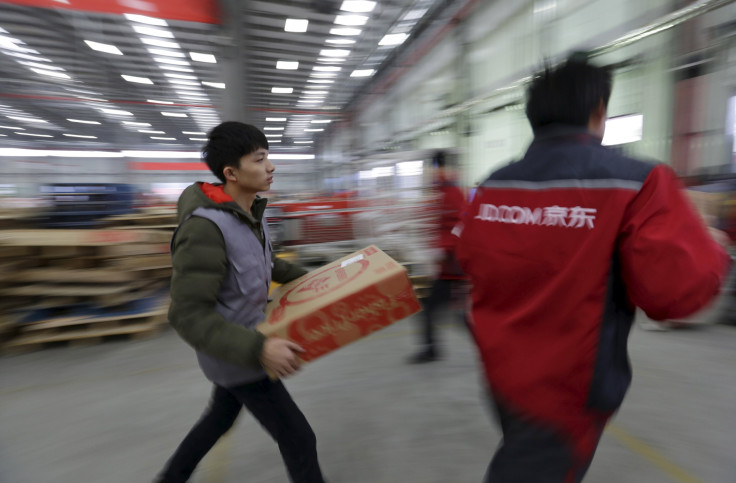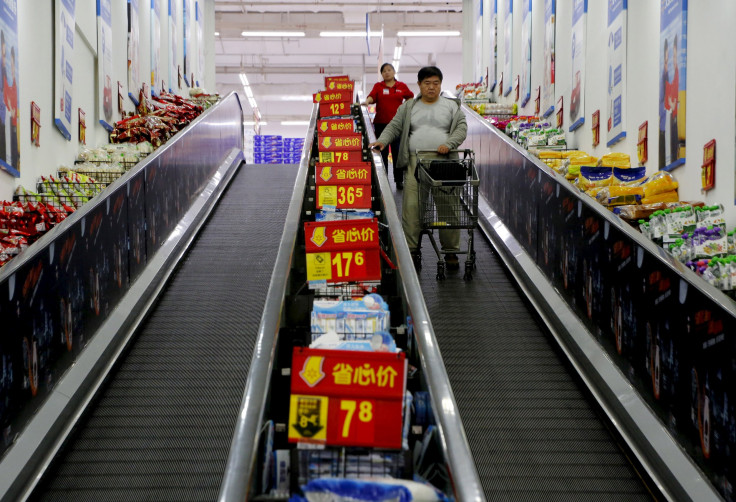China's Online Shopping Festival Breaks Records: Alibaba Sells Good Worth $14.3B, Plans Global Expansion

SHANGHAI -- Delivery staff were working overtime in China on Thursday as they coped with the aftermath of the country's record-breaking online shopping gala known as Single’s Day. Alibaba, China’s biggest e-commerce retailer, said it sold goods worth more than 91 billion yuan ($14.3 billion) during the Nov. 11 festival, more than 50 percent higher than the 2014 figure. Rival online shopping platform JD.com did not give sales figures, but said its orders had almost tripled from the previous year, to 20 million packages.
The event confirmed that China’s retail sector remains one of the bright spots in an economy that has slowed over the past year, with GDP growth down from 7.3 percent in 2014 to 6.9 percent in the last quarter, its slowest rate for six years.
Alibaba said it had some 1.7 million staff working on providing deliveries, along with 400,000 vehicles. In some areas deliveries were even reported to have been made by horse, including in the Inner Mongolian capital Hohhot, after the local government banned the use of three-wheeled electric tricycles in the city.
However, analysts noted that the high turnover was achieved thanks to discounts, which some said were bigger this year -- while others pointed out that consumers may often buy more goods for personal use to cheer themselves up at a time of economic slowdown. And China’s e-commerce industry continues to be dogged by allegations that it encourages the sales of fake goods. The festival has also been criticized for undermining social values: A commentary in the official Beijing Youth Daily newspaper published by the Communist Youth League said that “too much of a fixation on online shopping will twist people’s values, and could cause family and social conflicts." And one couple in southeastern Fujian province called police after getting into a fight over purchases worth more than $3,000, Hong Kong's South China Morning Post reported.
The Beijing Youth Daily said China’s young generation, who analysts say spend significant amounts of time online, needed a “healthy lifestyle and temperate consumption,” and should “increase face to face contacts and spend more time outdoors."

None of this put off Alibaba founder Jack Ma, who has said he hoped that the “Double 11 festival” (as it’s known in Chinese, for its date), will become a global event. Chinese media reported that the event, originally established in the 1990s as a way to cheer up those who were still single, and to provide an excuse to invite others on a date, is already starting to catch on in neighboring Taiwan. And its impact was also felt in Australia, where infant milk formula supplier Bellamy’s Organic apologized to domestic customers for shortages of its products this week. The company said it had been “taken… by surprise” by heavy demand for the product from China, where many buy imported milk because of concerns about the safety of domestic products.
Analysts said Ma, now China’s second-richest man since Alibaba was listed on the New York Stock Exchange last year, certainly succeeded in raising the event’s international profile, after inviting Daniel Craig to participate in the opening gala in Beijing, and persuading Kevin Spacey to record a trailer for the event in the character of President Frank Underwood from Netflix hit "House of Cards."
Ma was also boosted by a message of support from China’s Premier Li Keqiang -- who is seeking to promote an “internet plus” policy to boost China’s economy. Alibaba's share price, which had fallen sharply since last year's IPO in New York, has also received a boost in recent weeks.
However, some small online retailers complained that their profit margins reduced during the festival, the Global Times reported, while others bemoaned the fact that the festival sucked business from other times of year, while delivery staff salaries and costs are higher during the Singles’ Day period.
Concerns about quality and fakes also continue to be raised: A recent official Chinese survey showed that some 40 percent of goods sold online were either fake or of poor quality. And a commentator in the Global Times warned that the “feverish expansion may not be sustained if there is a lack of effective measures to crack down on fake goods.”
Alibaba has faced lawsuits from brand name companies who say its platforms encourage the sale of fake goods -- though the company says it has recently taken measures to prevent sales of such goods, the Global Times reported. Rival JD.com this month announced it was closing one of its own retail sites, Paipai, to prevent fraud and sales of fakes. Many Chinese customers have now shifted much of their online spending from Alibaba’s small retailer site Taobao to its branded merchandise platform Tmall, which features online stores operated directly by name brands and major retailers.

Despite the economic slowdown, latest retail figures showed continuing healthy growth of around 11 percent year on year in October. Online retailers also say that with the number of smartphones continuing to rise in China, there is still potential for further expansion of e-commerce. Some 70 percent of purchases on Singles' Day this year were made from mobile devices, retailers reported.
Alibaba is also now investing in creating an infrastructure to encourage online shopping in rural China: The company is setting up sales centers in thousands of villages across the country, to help farmers not used to buying online to make their purchases.
Many ordinary Chinese people were still talking about the festival a day later. Some complained they had got up early on Nov. 11 only to find that the goods they wanted were already sold out, but others were still excited about the savings they had made. “I stayed up until midnight at the beginning of Singles’ Day to start shopping ," Angie Chen, a Shanghai office worker in her early 30s, told International Business Times. Chen, who bought a new air purifier, luggage and clothes, added, "And then I was too happy thinking about the discounts I got to go to sleep afterwards.”
© Copyright IBTimes 2024. All rights reserved.





















